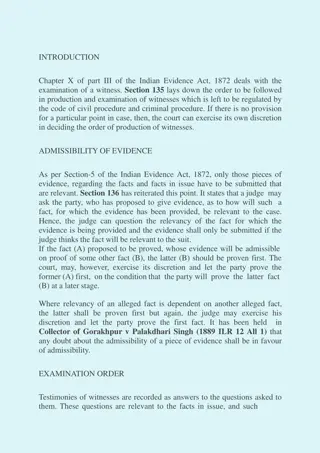Understanding the Indian Contract Act of 1872
The Indian Contract Act of 1872 is a significant legislation that governs contracts and agreements in India, excluding Jammu and Kashmir. It defines terms like contract, agreement, offer, and acceptance while outlining the essential elements required for a valid contract. The Act distinguishes between different types of contracts, including valid contracts, absolute contracts, and contingent contracts. It is essential for individuals and businesses to understand these concepts for creating legally enforceable agreements.
Download Presentation

Please find below an Image/Link to download the presentation.
The content on the website is provided AS IS for your information and personal use only. It may not be sold, licensed, or shared on other websites without obtaining consent from the author. Download presentation by click this link. If you encounter any issues during the download, it is possible that the publisher has removed the file from their server.
E N D
Presentation Transcript
THE INDIAN THE INDIAN CONTRACT ACT, 1872 CONTRACT ACT, 1872 D. Jogeswar Rao
Extent and Commencement It extends to the whole of India except the State of Jammu and Kashmir It came into force on the first day of September, 1872. The sale of Goods was repealed from this Indian Contract Act in 1930. Contracts relating to partnership were repealed in 1932.
Terminology CONTRACT - According to sec.2(h), a contract is defined as an agreement enforceable before the law. AGREEMENT - According to sec.2(e), every promise or set of promises forming consideration for each other. PROMISE - According to sec.2(b), when a person made a proposal to another to whom proposal is made, if proposal is assented there to.
Terminology OFFER - According to Sec.2(a), when a person made a proposal, when he signifies to another his willingness to do or to abstain from doing something. AGREEMENT = OFFER + ACCEPTANCE CONSENSUS - AD IDEM- According to Sec.13, meeting of minds or identity of minds or receiving the same thing in same sense at same time.
Contract Agreement Legal Obligation Contract All contracts are agreements but all agreements are not contracts. All contracts are agreements but all agreements are not contracts. CONTRACT = AGREEMENT + CONTRACT = AGREEMENT + ENFORCIBILITY BEFORE LAW ENFORCIBILITY BEFORE LAW
Essential Elements of a Valid Contract (Sec. 10) Offer & Acceptance Intention To Create Legal Relationship. Consensus - Ad - Idem. Consideration. Capacity To Contract. Free Consent. Legality Of Object. Possibility Of Performance. Writing & Registration.
Types of Contact VALID CONTRACTS Valid Contact: The Valid Contract as we discussed above on Essentials elements of a Contract is an agreement that is legally binding and enforceable. It must qualify all the essentials of a contract. Absolute contract: An absolute contract is one where the promisor performs the contract without any condition. Contingent contract(Sec. 31-36): a contract to do or not to do something, if some event, collateral to such contract, does or does not happen. Example: A contracts to pay B Taka 10,000 if B's house is burnt. This is a contingent contract. Enforcement of contracts contingent on an event happening.
Valid Contact Express contract: An express contract arises from interactions in which parties actually discuss the agreement and the promised terms. The express contract does not have to be formal or in writing. It simply requires that the parties express their intentions in an agreement. Implied/Quasi contract(Sec.68- 72): An express contract is an agreement that has been wholly spelled out either in writing or orally. This contract includes at least two parties who make legal promises to fulfill set/specified terms toward each other. They agree to be legally bound by these terms according to the law.
Invalid Contracts Invalid Contracts Void contract: The section 2(j) of the Act defines a void contract as A contract which ceases to be enforceable by law becomes void when it ceases to be enforceable . This makes all those contracts that are not enforceable by a court of law as void. Is void(Void - ab - initio):An agreement which is not valid from the beginning. Becomes void: An agreement which is valid in the beginning but due to some supervening impossibility the contract becomes void. Example: A agrees to pay B a sum of Rs 10,000 after 5 years against a loan of Rs. 8,000. A dies of natural causes in 4 years. The contract is no longer valid and becomes void due to the non- enforceability of the agreed terms.
Voidable Contract A voidable contract has all the elements of a valid and enforceable contract but has some flaws that could enable either party to void it. In such a contract, either of the parties has a choice of avoiding their duties. Some of the examples where a void contract becomes voidable are: Either of the parties is a minor. There is an injured party involved. The consent of one party was not free. One party was suffering from a legal disability. Any of the parties was a victim of fraud at the time of execution of the contract. The difference between valid and voidable contracts is that a void contract is not enforceable by law at any cost, but a voidable contract is treated as void only if a party chooses to treat it as voidable by opposing the enforcement of the contract.
Invalid Contracts Invalid Contracts Illegal contract -An agreement may be unlawful or illegal, as outlined in section 23 of the act. A contract that breaks some rule that is criminal or is against public policy is deemed as illegal. For example: A agrees to sell narcotics to B. Although this contract has all the essential elements of a valid contract, it is still illegal. Unenforceable contract -It is valid but due to some technical defect the contract becomes void. In case defects are removed the contract is enforceable.(lack of registration, lack of signature, Absence of writing, Ambiguous terms of the contract, etc.,) For example: A agrees to sell to B 100kgs of rice for 10,000/-. But there was a huge flood in the states and all the rice crops were destroyed. Now, this contract is unenforceable and can not be enforced against either party.
Types of Contracts (Extend to Execution) Executed contract - Executed Contract Section 2(h) of the Indian Contract Act, 1872 defines a contract as an agreement enforceable by law. Executed Contract : It is a contract that has been fully performed by both parties. In other words, a contract whose terms have been completely fulfilled. Once all parties sign the contract and the transaction is closed, the contract is considered to be an executed contract. Executory contract - An executory contract is a contract that has not yet been fully performed or fully executed. It is a contract in which both sides still have important performance remaining. However, an obligation to pay money, even if such obligation is material, does not usually make a contract executory.
Types of Contracts (Extend to Execution) Unilateral contract - In a unilateral contract, one party pays the other party to perform a certain duty. If the duty is fulfilled, the party on the other side of the contract is obligated to transfer the specified funds. Only this party is under obligation of the contract, whereas the acting party is not legally obliged to perform the duty. For example: if an individual places an advertisement in the newspaper to provide an award in the event a missing item is returned, that individual is obligated to pay the award if the item is indeed returned.
Types of Contracts (Extend to Execution) Bilateral contract - A bilateral contract is a contract in which both parties exchange promises to perform. One party s promise serves as consideration for the promise of the other. As a result, each party is an obligor on that party s own promise and an obligee on the other s promise. (compare: unilateral contract) For Example: If the buyer promises to pay the price and the seller promises to deliver the goods. In this example, the buyer and the seller obligate themselves reciprocally, so that the obligation to pay the price is correlative to the obligation to deliver the goods.























